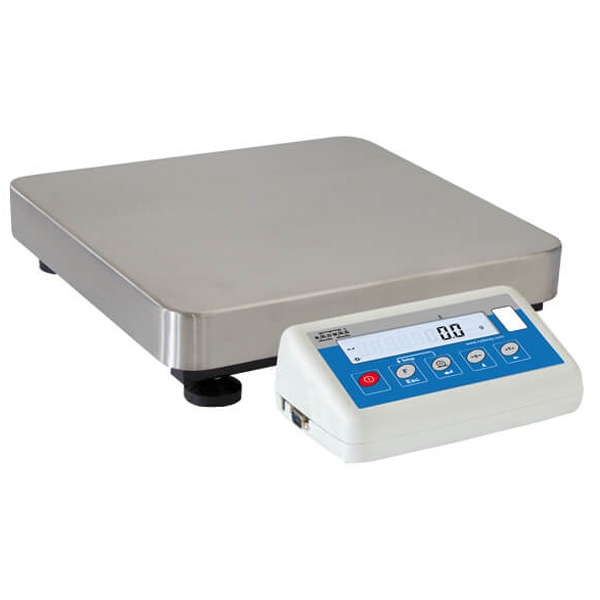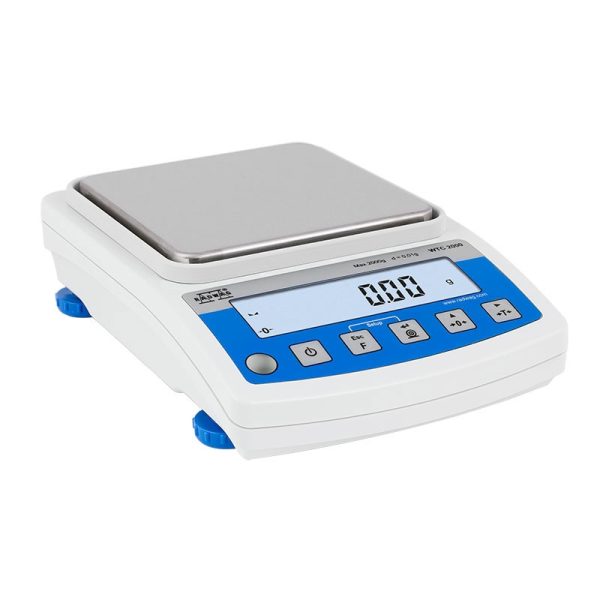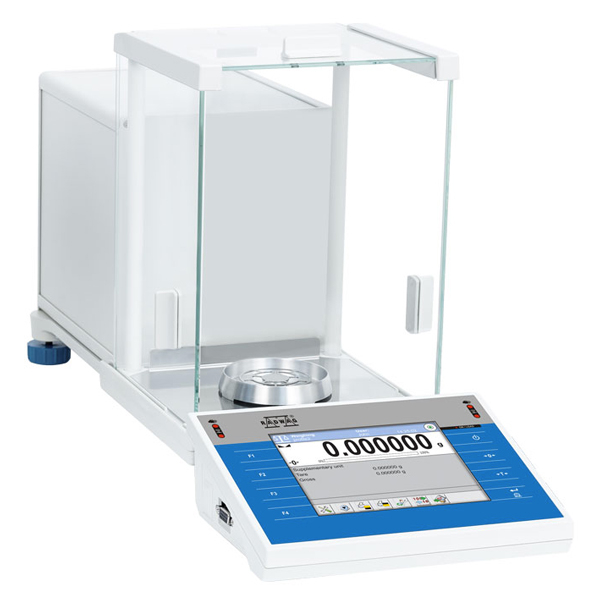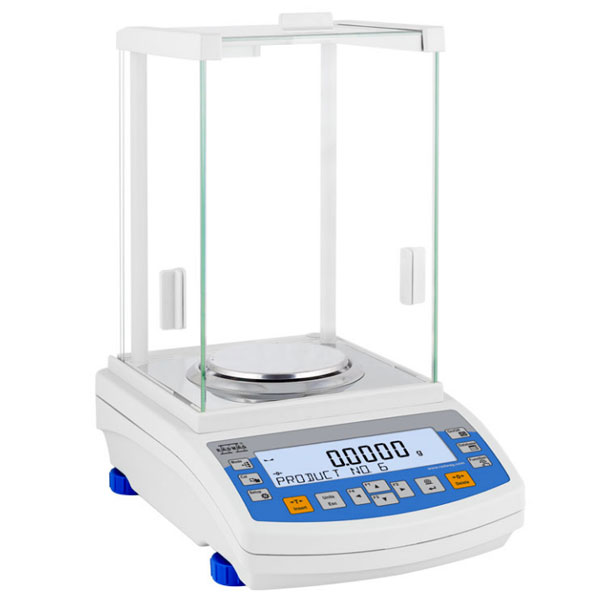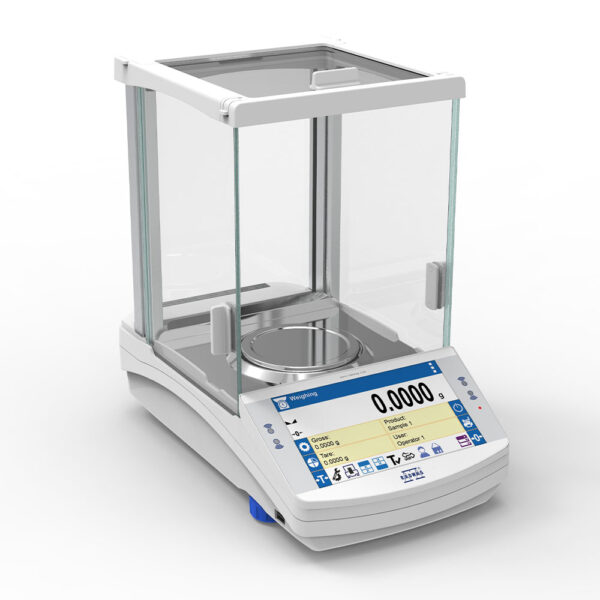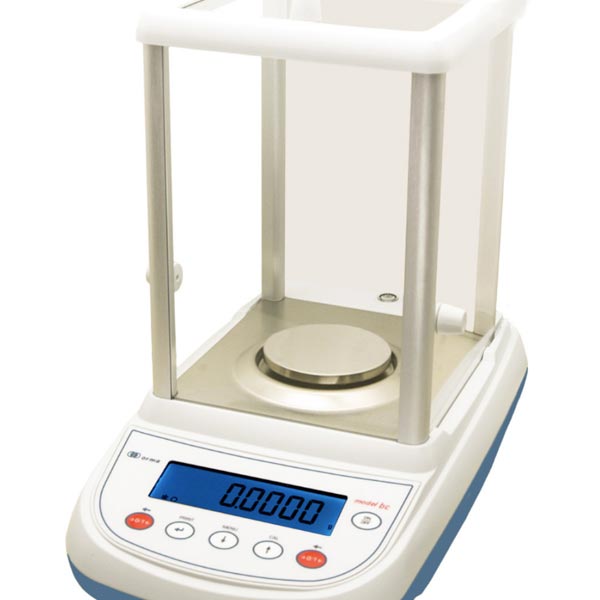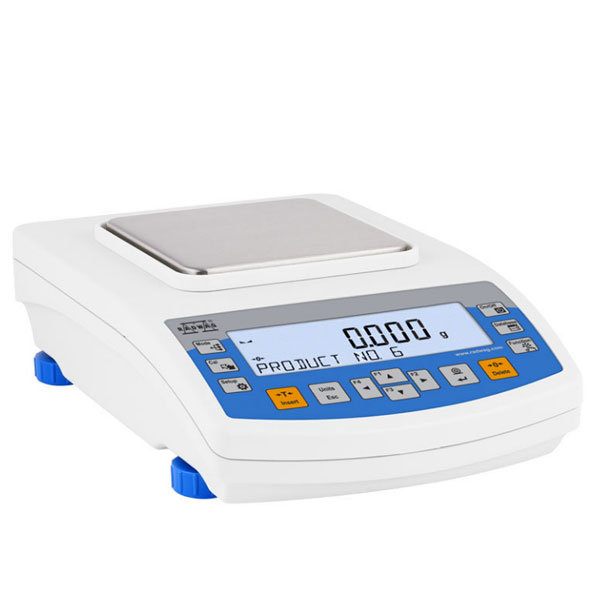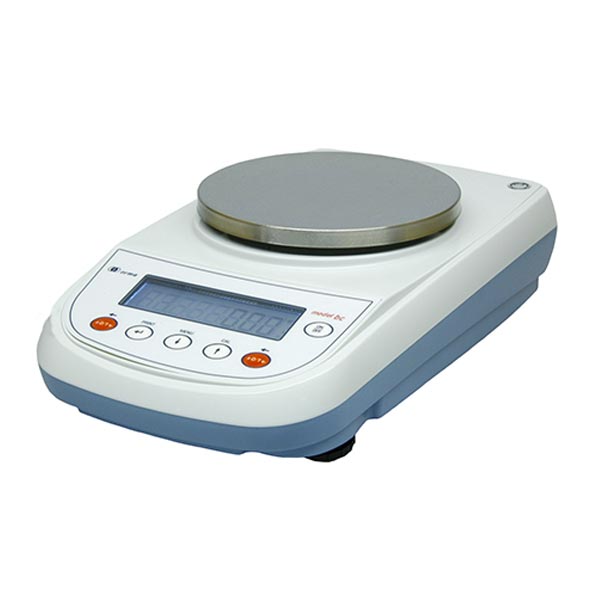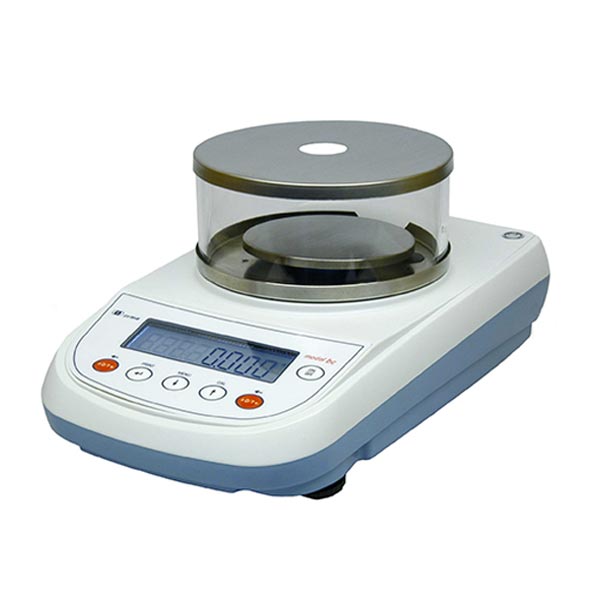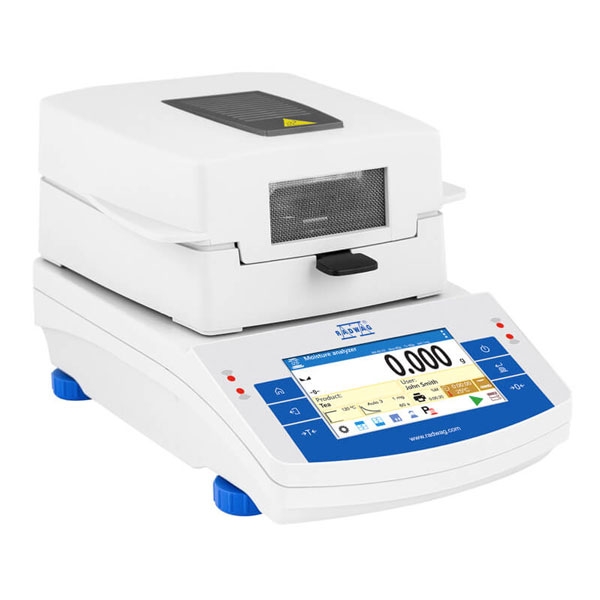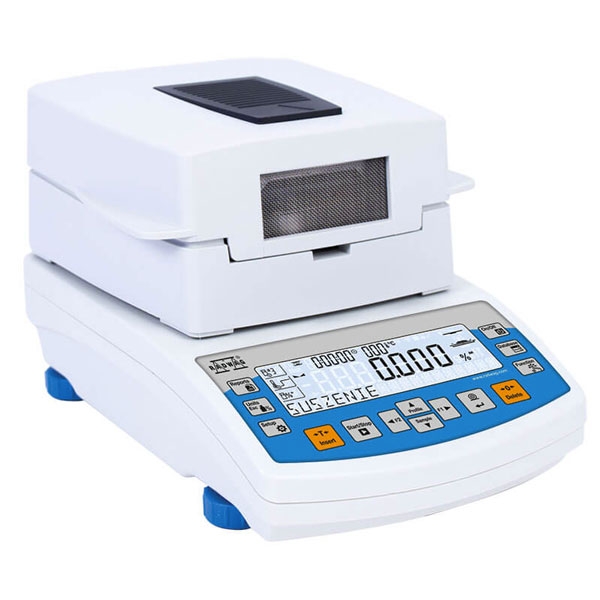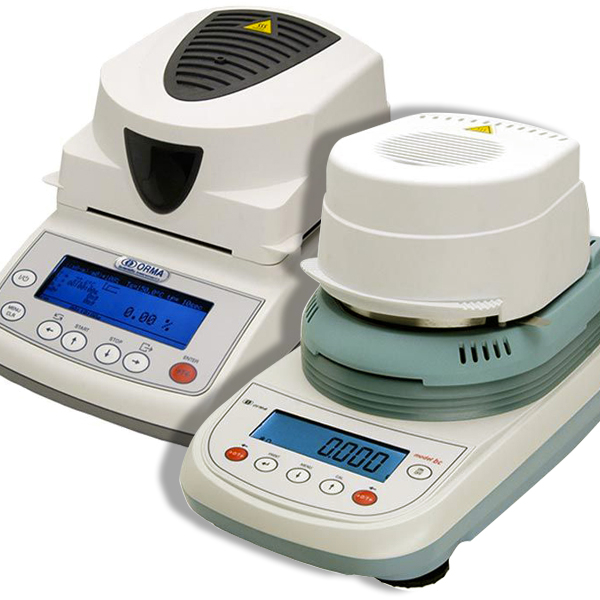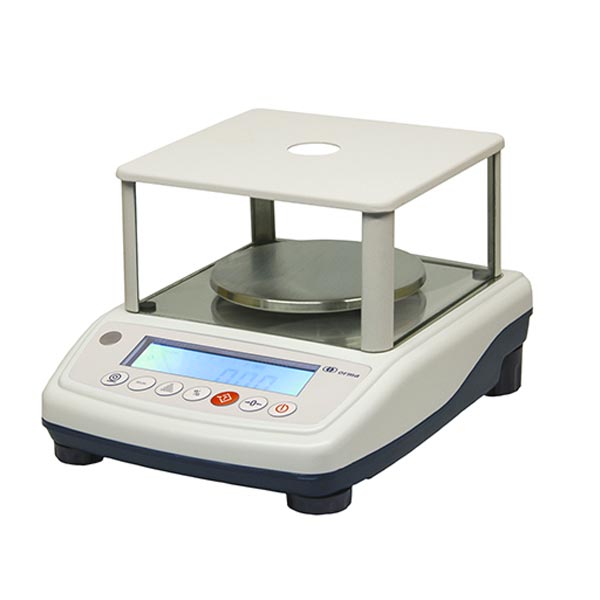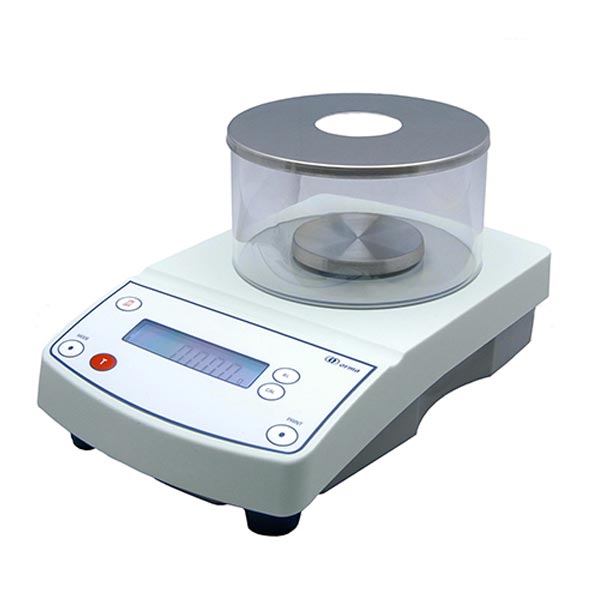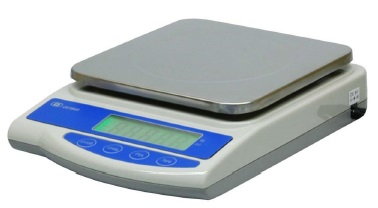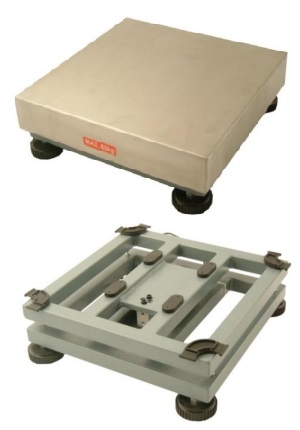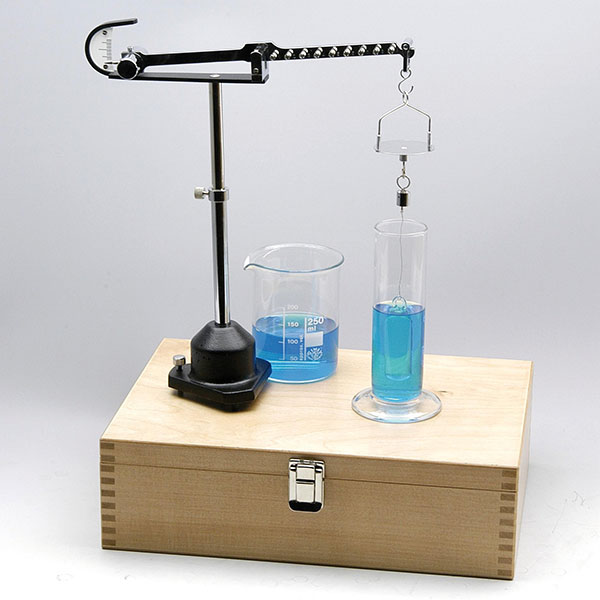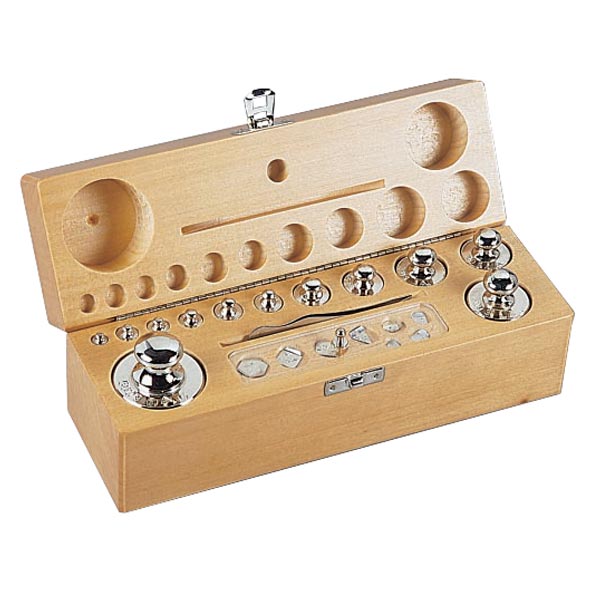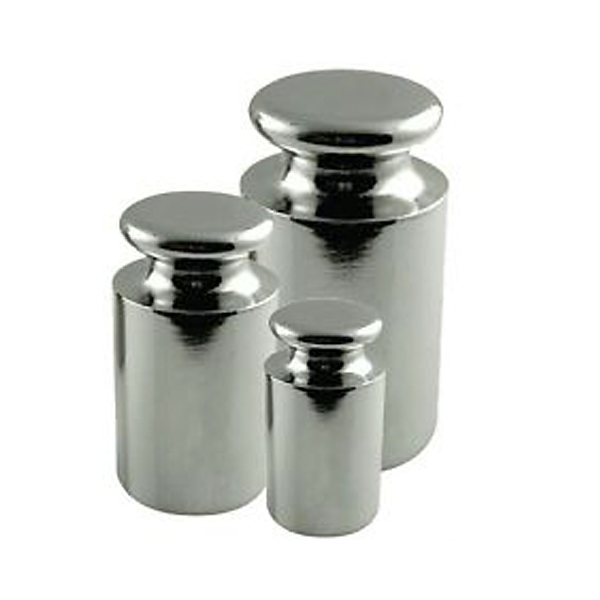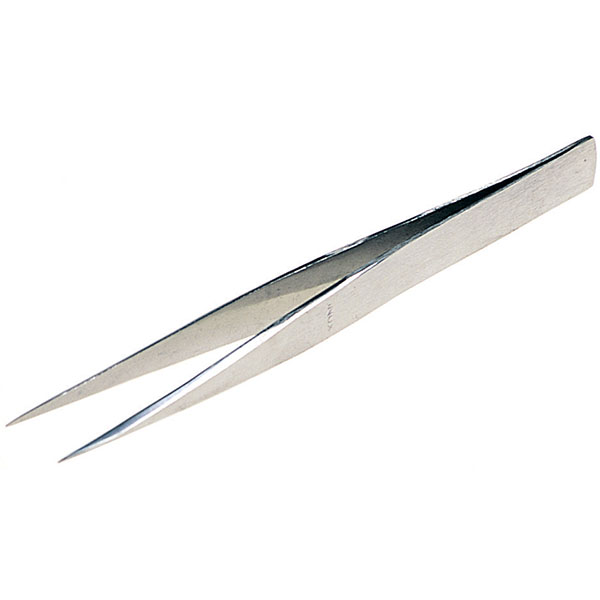The precision laboratory balance is the instrument used to measure mass.
Mass used to be defined as the amount of matter that makes up a body. But more accurately one could say that the mass of a body is a measure of its inertia, i.e. the resistance it opposes to all changes in its state of stillness or motion.
In fact, the mass of a body is a constant in itself, because it does not vary with changes in its position in space or with changes in its temperature.
The mass of a body remains unchanged even when it changes from a solid to a liquid state or from a liquid to a gaseous state.
Precision analytical balance

In chemistry laboratories, the most commonly used laboratory balances have only one pan. However, the chemicals to be measured cannot be placed directly on the pan. For this purpose, collection containers such as watch slides, beakers or porcelain capsules are used.
Obviously, these containers have their own weight. So the first step in weighing is to perform the tare, also known as zeroing.
Precision laboratory balance
.
In the laboratory, the precision balance enables automatic tare control. This makes weighing easier and faster.
After placing the substance in the container, the measurement can be read off the display. All very quick and easy. An example could be this model.
Chemistry laboratory balance
.
Mechanical balances were once used in chemistry laboratories.
This type of balance is equipped with a small display case into which the material to be weighed can be placed.
This space must be protected to prevent air from entering. Displacement of air could alter the precise measurement of weight.
We are talking about very sensitive precision balances that sense the change in mass of even a crumb of dust.
Physics scales
In physics laboratories, special attention is paid to errors in weight measurements.
Here are some potential sources of error in weight measurement systems:
- wrong reference weights
.
- air drafts
.
- friction of moving parts
- static dust
- scale not calibrated
- dishes not aligned
- balance out of calibration
- magnetic field effects
- electric field interference
- reaction between air and the substance to be measured
- condensation on a cold body
- evaporation on a hot body
- balance resting on an inclined plane
Sensitivity Laboratory Balance
With the mechanical balance, one must ensure that the plates on which the weights rest and the material are identical. It is enough for one of them to be oxidised to increase its weight.
This is why there are adjustment screws to equalise the two weights.
Milligram Precision Balance
.
The purpose of a laboratory balance is the exact weighing of a matter. But in the case of the precision balance, even more so, we are talking about high resolution. Among the different models, there are those with a resolution of 0.1 and 1 milligram 0.01/ 0.02/ 0.1/ 0.2/ 0.5 and 1 gram.
Precision balance 0.1 g
In the laboratory 0.1 g is a relatively coarse resolution. It is used for weighing powders, e.g. of chemicals. But it is also used for materials such as gold or food.
Precision balance 0.01 g
In contrast, a thousandth of a gram resolution is used for more accurate substances.
They can already be called precision balances. With this resolution, the average density of a substance, made up of the ratio of the mass of a body to its volume, can be measured.
Precision food scales
.
With the popularity of TV cooking shows such as Masterchef, the use of precision scales in the kitchen has increased. The accuracy of quantities sometimes determines the success of a recipe.
If we relate this to use in a laboratory, we realise the importance of a precise instrument.
Professional food scale
.
The professional food scale is aimed more at the food industry than at kitchens. Quality control and HACCP laboratories need to be equipped with professional precision scales to ensure maximum safety of the food handled.
 Precision scales
Precision scales
The highest precision requires that the load on the pan be kept constant. This is achieved by subtracting masses on the same side as the unknown weight, rather than increasing them. The final balance is achieved by using the force of a very small spring instead of subtracting a predetermined amount of mass.
Digital Balance
Digital scales are defined as an instrument for measuring weight electronically.
The value is shown on a display, sometimes with three decimal places, which ensures a convenient and accurate reading.
Digital scales description
Scales of different qualities are used. The two main types are technical scales and analytical precision scales. The difference between them lies in different sensitivity levels.
.
- Technical precision balances are sensitive to the hundredth of a gram.
The difference between them is the different levels of sensitivity.
- Analytical precision balances are sensitive to the tenth of a milligram.
 Analytical Balance
Analytical Balance
Precision analytical laboratory balances are so sensitive that, to avoid differences in weight measurement due to air displacement, they are equipped with two sliding side doors that, when closed, isolate the substance to be weighed.
These instruments have the possibility of displaying the weight in different units of measurement: grams, ounces, pounds, carats, and many others, selectable at the touch of a button.
The most advanced models also offer the possibility of measuring the different weighings in sequence and providing reports.
Digital Scale Sensitivity
The resolution is also chosen according to the capacity. The most common are the scales (capacity/resolution) of 6000g/0.1g, 4000g/0.01g and 600g/0.001.
Technical scales mainly have two types of load cells: electromagnetic compensation or strain gauges. These characteristics are to be chosen according to the capacity and resolution of the instrument.
Professional Digital Scales
Technical precision balances are laboratory precision balances with a maximum resolution defined as 1 mg (0.001 g). Beyond this resolution, balances are referred to as analytical. Electronic technical balances are predominantly used in chemical laboratories.
Electronic professional digital balance
.
Analytical precision balances are high-precision mass measuring instruments.
Accuracy starts at 0.1 mg and above.
Professional digital laboratory balance
.
The plate in which to insert the substance to be weighed is enclosed in a transparent container where neither dust nor air can alter the measurement. This 'cage' is provided with openings for inserting the matter. The matter itself must be at room temperature so that convection currents within the vessel do not alter the measurement.
 Electronic Scale
Electronic Scale
The electronic balance has a strong use in the laboratory due to its precision. But there are different types of electronic precision scales:
- Electronic bench scale
- portable electronic scale
- electronic scale with receipt
Electronic bench scale
The electronic bench scale is the one most commonly used in the laboratory. It is a fixed piece of equipment that works on the laboratory bench. It has larger dimensions to contain all the more detailed functions of the instrument.
Approved electronic bench scale
When certified measurements are to be taken, it is necessary to work with the appropriate equipment. Especially in the food industry, control processes must be certified and documented. For this, documentation of the protocols performed is necessary.
An approved electronic bench scale enables the workflow for this documentation to be printed out.
Amazon Electronic Bench Scale
E-commerce is also spreading in the industrial sector. But unlike in the consumer sector, in the professional sector e-commerce is added as a service to traditional channels.
In this case it is not an advantage to buy an electronic scale on Amazon. Especially if this means losing the advice of experienced suppliers who can provide valuable buying help.
Professional Electronic Scales
Professional electronic scales is a generic definition for a high quality instrument.
It differs from the now-discontinued mechanical scales in both accuracy and cost.
As with many other industries, the move to electronics entails a standardisation of processes. In return, it makes the workflow faster and more economical.
Professional Electronic Bench Scale
.
Of the electronic precision scales, bench scales are the most accurate and reliable. They are used in laboratories to ensure repeatability of measurements and reliability of values.
 Professional Electronic Food Scale
Professional Electronic Food Scale
In the food industry, professional weighing instruments are used.
The professional electronic food scale must meet certain requirements:
- dynamic percentage weighing
- check percentage weighing
- piece counting
- receipt or measure print
- accumulation measure
- price calculation
.
These tools are used in
- supermarket
- macelleria
- bakery
- food industry
Portable Electronic Weighing Instruments
Electronic weighing instruments have reached very low production costs. This means that small, portable precision scales are on the market at very low costs.
Portable Digital Scales
The use of a hand-held digital scale can range from weighing luggage to retail markets.
There are many applications for such a versatile instrument.
In the chemical field, it can be used to weigh substances collected in the field such as powders, grains or soil for environmental analysis.
Electronic scale with receipt
.
For the sale of products at retail as well as at the market, it is possible to use the electronic scale with receipt to comply with tax regulations.
In reality, it is not widely used because the classic electronic scale with a pan is more convenient and effective.
Users of this portable instrument are more common in the livestock sector, veterinarians and those working with animals.
Buying a precision scale
When it comes to buying a scale, one should only consider those companies that have been offering their customers a wide range of high-quality precision scales for several years now. After all, they are very useful instruments for measuring mass in milligrams and, because they have to deal with chemical reagents of various materials, they must be extremely accurate.
Milligram scales
Any self-respecting balance these days must be able to measure substances quite accurately. After all, it is not only grams that are measured, but also milligrams. Every laboratory balance has to deal with very precise natural sciences, whose task it is precisely to measure down to the tiniest details of precision.
Precision laboratory balances useful for measuring a substance down to the tiniest variations in its milligrams have only one measuring plate. However, it must be remembered that precision balances are not used by placing reagents directly on the plate, but rather other objects typical of a chemical laboratory are used. In fact, the reagent previously measured could remain on the measuring plate in small grains that would then have to be removed, otherwise the measurement of the next reagent would be compromised: this would be an error.
Unfortunately, a milligram balance can be adequately calibrated and the reagents can therefore be measured with great precision. Numerous models of precision scales can be found on the market today, including those for 1 gram, 1 milligram, 0.01 of a gram and so on. Everyone should choose the precision balance that meets their measurement needs.
.
Precision laboratory balance
.
Factors such as dust, incorrect mass references, but also air and condensation could compromise the measurement and lead to the meter being wrong. This is one of the reasons why balances are manufactured in such a way as to prevent this from happening. They are professional precision scales, whose operation is optimised for specific environments. However, they are all high-precision digital scales. The weight is measured electronically and the measurement value is shown on the display.
.
Professional Precision Scales
.
Professional precision balances have succeeded in occupying a considerable market sector by becoming one of the most important measuring instruments used in the chemical and physical fields. They have always been used by real professionals in the sector, helping them to carry out very precise analyses. Because like it or not, in a sector such as the chemical industry, you have to rely solely on well-made professional instruments. Otherwise, you risk making mistakes and compromising the entire quality of your work. In addition to fixed professional precision balances, there is a wide range of portable professional precision balances on the market. These are instruments that can be moved with very little effort and at the same time help to measure matter virtually anywhere. However, it is best to be careful with the temperature, as it must not affect the proper functioning of the balance.
Precision Scales
Among other precision scales that can be purchased, precision scales stand out. They too are 100% professional precision scales. They have numerous applications and can be considered very versatile instruments. In fact, they can help perform a wide range of particularly diverse tasks. In the chemical field, precision balances are used for weighing collected substances, including soil, powders, reagents and grains.
.
.
See also Radwag 0.01/0.1 mg AS-series analytical balances
See also BC Series Electronic Balances 0.01 g
.

Precision scales
|

Precision scales
|

Precision scales
|

Precision scales
|

Precision scales
|

Precision scales
|

Precision scales
|

Precision scales
|

Precision scales
|

Precision scales
|

Precision scales
|

Precision scales
|

Precision scales
|

Precision scales
|

Precision scales
|

Precision scales
|

Precision scales
|

Precision scales
|




 Precision scales
Precision scales Analytical Balance
Analytical Balance Electronic Scale
Electronic Scale Professional Electronic Food Scale
Professional Electronic Food Scale
